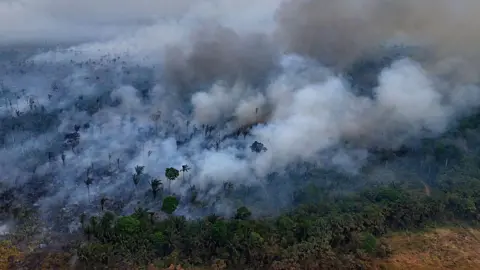The alarming rate at which the world’s tropical forests are being destroyed has reached unprecedented levels, as reported by recent satellite analyses. There is a dismal statistic indicating that during the year 2024, a staggering 67,000 square kilometers (26,000 square miles) of these vital ecosystems were lost. This area is roughly equivalent to the size of the Republic of Ireland or represents an astonishing loss of approximately 18 football fields every minute. Tropical rainforests play an essential role in combating climate change by storing vast amounts of carbon, and their degradation presents significant global risks.
Fires have emerged as the leading cause of deforestation, surpassing agricultural clearances for the first time in recorded history. This is particularly concerning in the Amazon rainforest, which experienced record-high drought conditions contributing to widespread fire incidents. The combination of prolonged drought, aggravated by climate change, made it easier for fires to spread uncontrollably, with Brazil and Bolivia being the worst hit. The alarming rise in fire incidents indicates a concerning trend in the resilience of tropical forests under the mounting pressures of a warming planet.
However, there are glimmers of hope. In South East Asia, proactive government policies have effectively mitigated forest loss. For instance, Indonesia reported an 11% decrease in primary forest destruction in 2024, demonstrating that collective effort and commitment from authorities and local communities can lead to significant improvements. These efforts included enforcing regulations against land-burning practices, which have proven effective in curbing forest degradation.
Prof. Matthew Hansen, co-director at the GLAD laboratory of the University of Maryland, has expressed fears regarding the future of these forests. He noted that some areas, especially parts of the Amazon, may be nearing a critical “tipping point.” If breached, this tipping point could lead to irreversible damage, where lush rainforests collapse into savanna ecosystems. Such a transformation would signal a devastating loss not only of biodiversity but also have far-reaching consequences on global climate patterns.
While the historical data indicates a record loss, it aligns with the expected intensification of tropical fires under climate change scenarios. Rod Taylor from the World Resources Institute pointed out that the past year signifies a transition—a new phase where the traditional drivers of deforestation morph into phenomena intensified by climate feedback loops. These feedback loops translate into more intense and vicious forest fires that exacerbate the overall carbon emissions from the tropical forests.
The loss of tropical forests is monumental, with estimates indicating 3.1 billion tonnes of planet-warming gases released as a result, equating to emissions comparable to those produced by the European Union. The ecological implications are dire, affecting not only the species that inhabit these biodiverse regions but also thwarting global efforts to combat climate change.
The upcoming UN climate summit COP30, hosted in the Amazon, presents a critical opportunity for galvanizing international cooperation on forest protection schemes. Proposed initiatives may involve rewarding countries for maintaining their tropical forests, which is particularly pertinent as current financial structures often favor deforestation over conservation. Despite the challenges highlighted, the success story in South East Asia stands as a testament to the positive outcomes that can arise from political will and sustained commitment.
In conclusion, while the statistics paint a bleak picture of tropical forest destruction in 2024, they also spotlight areas where effective policies have resulted in improved outcomes. The pressing need for a collaborative global response to protect these ecosystems has never been more urgent, and the lessons learned from nations like Indonesia may serve as a crucial path forward in the battle against deforestation and climate change.



